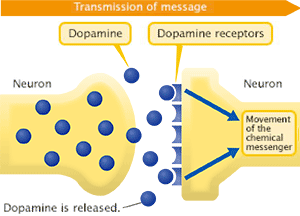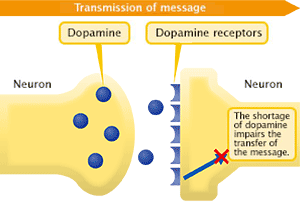What are the causes of Parkinson's disease?
Symptoms manifest due to a malfunction of dopamine neurons
The brain is the central control tower that governs the condition of the body.
Messages sent out by the brain are transmitted from one nerve cell (neuron) to the next by neurotransmitters that pass the message on like a baton during a relay race, causing your body to move in reaction to the message. In Parkinson's disease, levels of dopamine, a neurotransmitter in a part of the brain called the substantia nigra, decrease, causing a loss of control over body movement.
It is still not fully understood what causes the amount of dopamine to decrease. Changes in the brain associated with age and, in some cases, changes related to a person's genes, are presumed to be the cause.
Supplementing the deficient dopamine with medication can lessen the symptoms of Parkinson's disease.








